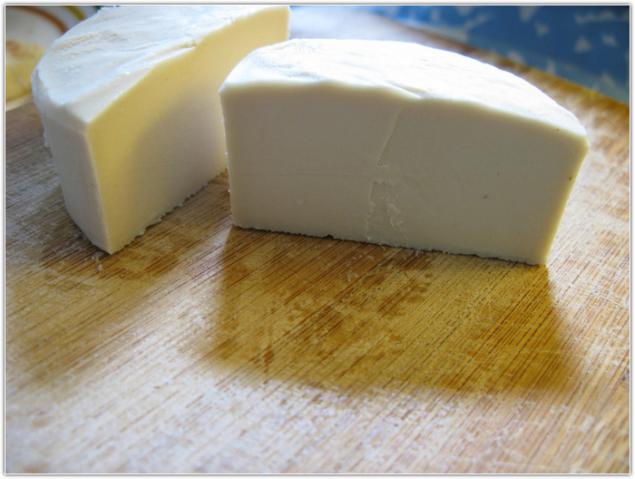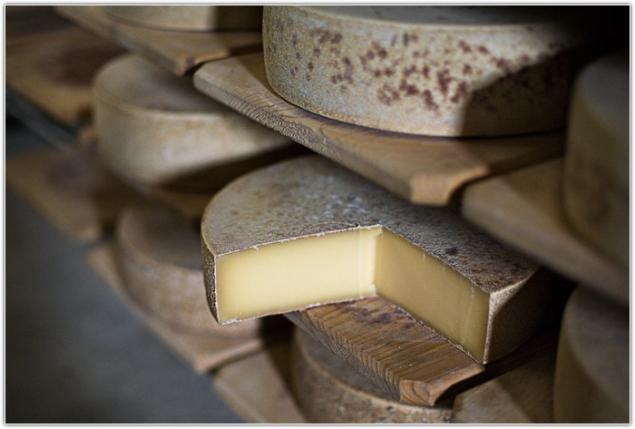795
How to store cheese? (8 photos)
Cheese is a living product that is constantly in development, so during storage must comply with certain conditions. In poor storage accelerates the ripening process, its development is going wrong, can dry out the cheese can spoil the appearance of the cheese itself becomes unusable.

Ideal conditions for the storage of cheese are:
- A constant temperature of 6 to 8 ° C
- A constant level of humidity of about 90 percent
- Ventilated room

Too low temperature storage kills cheese (so, if the cheese is frozen, then thaw it will crumble), and too high - kills its structure. Similarly, the humidity is bad for cheese too high causing spoilage and too low - dries.

Here are some tips to help you keep the cheese as much as possible and better and enjoy the real taste of it:
First of all, cheese is better not to buy too much. It is better to do it more often, and take as much cheese as you like, than to store it for a long time at home surpluses.

Avoid exposing the cheese a sharp temperature changes and store it in the refrigerator on the bottom shelf, in the department for fruits and vegetables.
Cheese must be stored wrapped, since, firstly, it easily absorbs all odors, and secondly, that quickly dries at low humidity, which is refrigerated.
Cheese is left for storage in paper, even at low temperatures hardens and dries quickly. To the cheese from drying out and moldy, I advise you first wrap it in a clean parchment, tracing paper or plastic wrap and then put in a plastic bag or put in plastic, glass or ceramic Sarnitsa with a lid, but not sealed dishes, and only then put Refrigerate. The refrigerator should be Sarnitsa put on the lowest shelf or in a drawer for vegetables. The optimum temperature for storage of cheese - from + 5 ° C to + 8 ° C.

When storing the cheese out of the refrigerator it is recommended to wrap soaked in lightly salted water, linen napkin and keep in a place that it is not in direct sunlight. At home, hard cheeses can be stored 7-10 days, thus it is necessary to make sure that there was no mold. Soft cheeses are stored no more than 3 days, t. To. They quickly grow old. Cream cheese is stored in an open package is not more than two days, otherwise they will dry and lose their quality.

Brine cheeses should preferably be stored in the prepared water, and even better in the serum of weak brine. Before the use of brine cheeses and cheese is not recommended to pour boiling water because the cheeses lose some fat, protein coagulates and lower their nutritional value. Lower salinity brine cheese or cheese can be, if cut them into small pieces and put in boiled water or milk at room temperature for 10-12 hours.

And if a lot of cheese and keep it takes a long time, the freezer - a good choice for hard and semi-hard cheese. However, then it may crumble, but their taste is not lost. Cheese purchased in sealed packaging, stored too long.
Small pieces of cheese are well kept in an enamel or glass pan, covered in the refrigerator. Can there still putting a sugar cube, it absorbs any excess moisture, and periodically change it fresh.
So keep your cheeses correctly.
via

Source:

Ideal conditions for the storage of cheese are:
- A constant temperature of 6 to 8 ° C
- A constant level of humidity of about 90 percent
- Ventilated room

Too low temperature storage kills cheese (so, if the cheese is frozen, then thaw it will crumble), and too high - kills its structure. Similarly, the humidity is bad for cheese too high causing spoilage and too low - dries.

Here are some tips to help you keep the cheese as much as possible and better and enjoy the real taste of it:
First of all, cheese is better not to buy too much. It is better to do it more often, and take as much cheese as you like, than to store it for a long time at home surpluses.

Avoid exposing the cheese a sharp temperature changes and store it in the refrigerator on the bottom shelf, in the department for fruits and vegetables.
Cheese must be stored wrapped, since, firstly, it easily absorbs all odors, and secondly, that quickly dries at low humidity, which is refrigerated.
Cheese is left for storage in paper, even at low temperatures hardens and dries quickly. To the cheese from drying out and moldy, I advise you first wrap it in a clean parchment, tracing paper or plastic wrap and then put in a plastic bag or put in plastic, glass or ceramic Sarnitsa with a lid, but not sealed dishes, and only then put Refrigerate. The refrigerator should be Sarnitsa put on the lowest shelf or in a drawer for vegetables. The optimum temperature for storage of cheese - from + 5 ° C to + 8 ° C.

When storing the cheese out of the refrigerator it is recommended to wrap soaked in lightly salted water, linen napkin and keep in a place that it is not in direct sunlight. At home, hard cheeses can be stored 7-10 days, thus it is necessary to make sure that there was no mold. Soft cheeses are stored no more than 3 days, t. To. They quickly grow old. Cream cheese is stored in an open package is not more than two days, otherwise they will dry and lose their quality.

Brine cheeses should preferably be stored in the prepared water, and even better in the serum of weak brine. Before the use of brine cheeses and cheese is not recommended to pour boiling water because the cheeses lose some fat, protein coagulates and lower their nutritional value. Lower salinity brine cheese or cheese can be, if cut them into small pieces and put in boiled water or milk at room temperature for 10-12 hours.

And if a lot of cheese and keep it takes a long time, the freezer - a good choice for hard and semi-hard cheese. However, then it may crumble, but their taste is not lost. Cheese purchased in sealed packaging, stored too long.
Small pieces of cheese are well kept in an enamel or glass pan, covered in the refrigerator. Can there still putting a sugar cube, it absorbs any excess moisture, and periodically change it fresh.
So keep your cheeses correctly.
via

Source:























